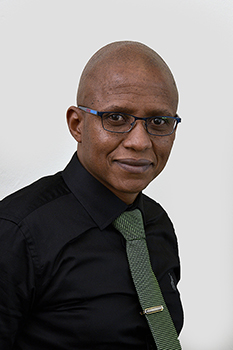Latest News Archive
Please select Category, Year, and then Month to display items
04 April 2024
|
Story Lunga Luthuli
|
Photo SUPPLIED
 Dr Juliet Kamwendo champions gender-inclusive climate action in Africa. Her expertise at the recently held AFR100 workshop highlighted vital steps towards sustainable and equitable development.
Dr Juliet Kamwendo champions gender-inclusive climate action in Africa. Her expertise at the recently held AFR100 workshop highlighted vital steps towards sustainable and equitable development.
Dr Juliet Kamwendo, Lecturer and Programme Director for Gender Studies in the Centre for Gender and Africa Studies at the University of the Free State, is spearheading efforts to integrate gender considerations into Africa's climate restoration agenda. Reflecting on her involvement, Dr Kamwendo stated, "This is particularly crucial, as women make up almost 50% of the population in Africa, and the depletion and degradation of land affect them disproportionately."
She recently served as a gender expert at the AUDA-NEPAD AFR100 workshop in Ouagadougou, Burkina Faso, from 25 to 29 March 2024. This initiative aims to restore forests and degraded land across Africa by 2030, with a focus on gender equality.
The workshop emphasised the integration of gender perspectives into the AFR100 project, acknowledging the disproportionate impact of land degradation on women. Dr Kamwendo's expertise highlighted the need to empower women in climate change interventions, addressing existing gender inequalities exacerbated by environmental degradation.
“Women – who are primarily responsible for household food security and water provision – bear the brunt of environmental degradation, leading to increased workloads, reduced income opportunities, and heightened vulnerability to climate-related disasters. Furthermore, the loss of forest cover and biodiversity further exacerbates the challenges faced by women, particularly in rural areas where they depend heavily on natural resources for their livelihoods,” added Dr Kamwendo.
Her participation highlights academia's crucial role in fostering inclusive and sustainable development, emphasising interdisciplinary collaboration to tackle complex environmental challenges. Through initiatives such as AFR100, stakeholders are working towards a more resilient and gender-responsive future for Africa.
New Dean of Student Affairs appointed
2016-08-23

Pura Mgolombane, newly-appointed
Dean of Student Affairs at the
University of the Free State.
Photo: Charl Devenish
“Students must always remember that people are human beings before any other identity they may embody.”
This is the message to the students of the UFS campuses from Pura Mgolombane, newly-appointed Dean of Student Affairs at the University of the Free State (UFS) in August 2016. He has replaced Cornelia Faasen, who acted as Dean from December 2014 to July 2016.
Being part of the Kovsie community
Previously, he was part of the Kovsie family as Assistant Dean of Student Life and Leadership (2011-2013). Before that, he was the Diversity, Ethics, and Social Justice Manager at the University of the Witwatersrand from August 2013 to July 2016. Mgolombane said he is most excited to “observe and experience an inclusive culture” at the university.
“I am looking forward to being part of a team that creates sufficient conditions for every member of the Kovsie community to feel that they belong here; from Qwaqwa campus, to South campus, to Bloemfontein campus.”
Making sure humanity comes first
His primary focus will be “to create Humanising Student Lived Experiences”. I want to create conditions where students feel that their humanity matters, because it is in such conditions that students are likely to excel academically,” he said.
These conditions will be created through the introduction of programmes and activities known as pedagogies, namely the humanising pedagogy and the pedagogy of discomfort. “All of these pedagogies and frameworks will be contained and further clarified in the Dean of Student Affairs Strategy which will be finalised no later than December 2016.”
Overcoming challenges faced by students
Regarding the challenges facing UFS students, Mgolombane said that “it is only when all out humanity is affirmed that we are likely to find lasting peace.
“Those who are in power or privileged positions have a responsibility to be in solidarity with the marginalised groups in pursuit of Social Justice.”